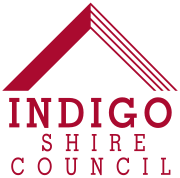Shire of Indigo
| Shire of Indigo Victoria | |||||||||||||||
|---|---|---|---|---|---|---|---|---|---|---|---|---|---|---|---|
 Location in Victoria | |||||||||||||||
| Population | 17,368 (2021 census)[1] | ||||||||||||||
| • Density | 8.514/km2 (22.05/sq mi) | ||||||||||||||
| Established | 1994 | ||||||||||||||
| Gazetted | 18 November 1994[2] | ||||||||||||||
| Area | 2,040 km2 (787.6 sq mi)[1] | ||||||||||||||
| Mayor | Bernard Gaffney | ||||||||||||||
| Council seat | Beechworth | ||||||||||||||
| Region | Hume | ||||||||||||||
| State electorate(s) | Benambra | ||||||||||||||
| Federal division(s) | Indi | ||||||||||||||
 | |||||||||||||||
| Website | Shire of Indigo | ||||||||||||||
| |||||||||||||||
The Shire of Indigo, a local government area (LGA) in the Hume region of Victoria, Australia, lies in the north-east part of the state. It covers an area of 2,040 square kilometres (790 sq mi) and in August 2021 had a population of 17,368.[1]
It includes the towns of Beechworth, Chiltern, Rutherglen and Yackandandah. It formed in 1994 from the amalgamation of the Shire of Rutherglen, Shire of Chiltern, Shire of Yackandandah and United Shire of Beechworth.[2]
The Shire is governed and administered by the Indigo Shire Council; its seat of local government and administrative centre is located at the council headquarters in Beechworth, it also has service centres located in Chiltern, Rutherglen and Yackandandah. The Shire is named after the Indigo Valley and Indigo Creek, geographical features that meander through the LGA and into the Murray River.
In 2008, the Bankwest Quality of Life Index rated Indigo fifteenth of 590 Australian local government areas.[3]
Council
[edit]Current composition
[edit]As of 22 September 2016, the council is composed of seven councillors elected to represent an unsubdivided municipality.[4]
| Ward | Councillor | Notes | |
|---|---|---|---|
| Unsubdivided | Jenny O'Connor | Mayor, Member of the Greens[5] | |
| Sophie Price | Deputy Mayor | ||
| Bernard Gaffney | |||
| James Trenery | |||
| Barbara Murdoch | |||
| Larry Goldsworthy | |||
| Diane Shepheard | |||
The makeup of the council is as follows:[6]
| Party | Councillors | |
|---|---|---|
| Unaligned | 6 | |
| Greens | 1 | |
| Total | 7 | |
Administration and governance
[edit]The council meets in the council chambers at the council headquarters in the Beechworth Municipal Offices, which is also the location of the council's administrative activities. It also provides customer services at both its administrative centre in Beechworth, and its service centres in Chiltern, Rutherglen and Yackandandah.
Townships and localities
[edit]The 2021 census, the shire had a population of 17,368 up from 15,952 in the 2016 census[7]
| Population | ||
|---|---|---|
| Locality | 2016 | 2021 |
| Allans Flat | 318 | 297 |
| Barnawartha | 904 | 987 |
| Beechworth | 3,859 | 4,274 |
| Brim | 171 | 181 |
| Browns Plains | 102 | 99 |
| Bruarong | 77 | 114 |
| Carlyle | 79 | 82 |
| Population | ||
|---|---|---|
| Locality | 2016 | 2021 |
| Charleroi | 73 | 82 |
| Chiltern | 1,605 | 1,580 |
| Chiltern Valley | 60 | 77 |
| Cornishtown | 96 | 94 |
| Gooramadda | 58 | 62 |
| Gundowring^ | 214 | 208 |
| Huon | 219 | 206 |
| Population | ||
|---|---|---|
| Locality | 2016 | 2021 |
| Indigo Valley | 329 | 346 |
| Kergunyah | 215 | 232 |
| Kiewa | 474 | 483 |
| Lilliput | 76 | 84 |
| Norong | 118 | 130 |
| Osbornes Flat | 233 | 285 |
| Rutherglen | 2,378 | 2,579 |
| Population | ||
|---|---|---|
| Locality | 2016 | 2021 |
| Sandy Creek | 179 | 200 |
| Staghorn Flat^ | 293 | 368 |
| Stanley | 364 | 371 |
| Tangambalanga | 542 | 908 |
| Wahgunyah | 1,098 | 1,061 |
| Wooragee | 345 | 342 |
| Yackandandah | 1,811 | 2,008 |
^ - Territory divided with another LGA
See also
[edit]References
[edit]- ^ a b c Australian Bureau of Statistics (28 June 2022). "Indigo (Local Government Area)". 2021 Census QuickStats. Retrieved 17 November 2023.
- ^ a b Victoria Government Gazette – Online Archive (1837–1997). "S87 of 1994: Order estg (Part 3) the Shire of Indigo". State Library of Victoria. State Government of Victoria (published 18 November 1994). p. 3. Retrieved 10 January 2014.
- ^ "BankWest Quality of Life Index 2008" (PDF). Bankwest. 20 August 2008. p. 8. Archived from the original (PDF) on 25 February 2009. Retrieved 3 September 2008.
- ^ Local Government in Victoria. "Indigo Shire Council". Department of Transport, Planning and Local Infrastructure. State Government of Victoria. Retrieved 10 January 2014.
- ^ "Jenny the region's first Green". The Border Mail. 29 October 2012. Retrieved 31 October 2012.
- ^ VEC. "Results for Indigo Shire Council Elections 2012". Victorian Electoral Commission. Victorian Electoral Commission. Retrieved 31 October 2012.
- ^ "Census | Australian Bureau of Statistics". www.abs.gov.au. 11 January 2023.

